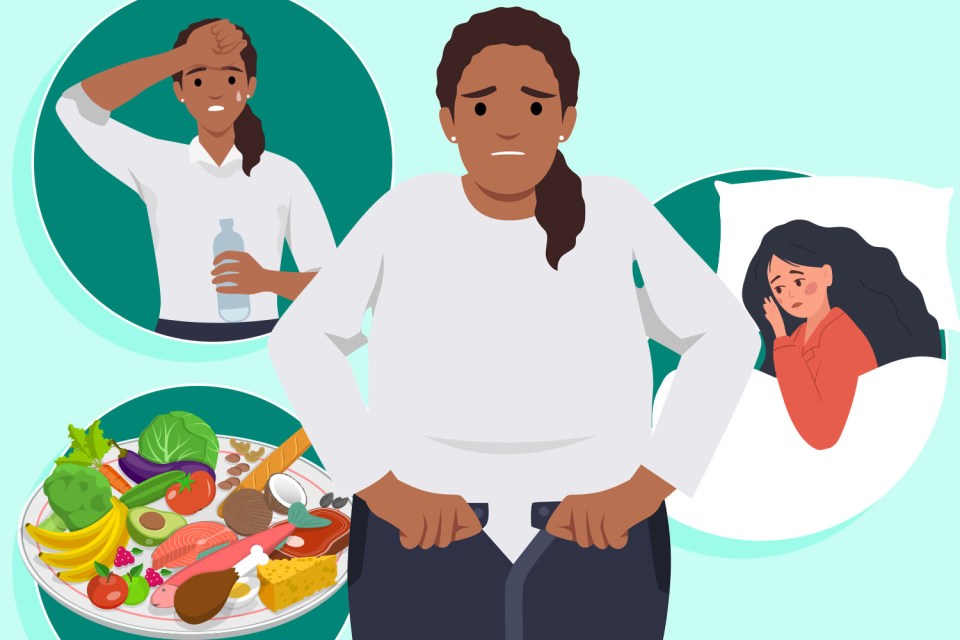FEELING constantly hungry can hinder weight loss efforts, especially when combined with a calorie-restricted diet.
While slight hunger is normal during a calorie deficit, excessive hunger can lead to overeating, sabotage exercise routines, and ultimately impact weight loss goals.
But a weight loss expert has revealed the real reason many of us feel constantly hungry – and it’s not because we need more food.
In fact, your hunger might have more to do with how you’re living than what you’re eating.
Professor Franklin Joseph, head of Dr Frank’s weight loss clinic, says that in many cases, what we mistake for hunger is actually the result of three common daily habits that are completely fixable – no calorie-counting required.
“People tell me they’re always hungry – even straight after eating – but in most cases, it’s not true hunger,” says Prof Joseph.
“It’s usually a case of your body being thrown off by simple mistakes that are easy to correct.”
So what are these hunger triggers? According to Prof Joseph, here are the top three:
1. You’re not drinking enough water
Mild dehydration is one of the most common causes of mistaken hunger, according to Prof Joseph.
“Even being slightly low on fluids can make you feel tired, foggy and craving sugar or snacks – when what you really need is a glass of water,” he explains.
Drinking a large glass of water first thing in the morning and again whenever you feel a sudden urge to snack is recommended.
2. You’re not sleeping properly
Poor sleep disrupts the hormones that control appetite, said Prof Joseph.
“When you’re sleep-deprived, your body produces more ghrelin – the hormone that tells you you’re hungry – and less leptin, which tells you you’re full,” he adds.
The result? You’ll crave carbs, sugar, and comfort food – even if you’ve already eaten enough.
3. You’re not eating balanced meals
Many people cut calories or carbs, but end up with meals that don’t actually satisfy them.
Prof Joseph advises: “If you’re eating meals that are low in protein or fibre, your blood sugar will crash soon after – and you’ll feel hungry again far too soon.”
He recommends including a source of lean protein (like chicken, fish, lentils, or tofu), fibre-rich veg, and slow-release carbs at each meal to stay fuller for longer.
True hunger builds gradually and comes with physical signs like a rumbling stomach or low energy.
But if it comes on suddenly or disappears after a drink or a distraction, it probably wasn’t hunger at all.
“Fix these three habits, and you’ll feel more in control of your appetite almost immediately,” says Prof Joseph.
The NHS 12-step plan to help you lose weight
FROM faddy diets to dodgy detoxes – most of us have heard it all before when it comes to weight loss.
But burning fat can be easy and mostly free.
In fact, the NHS has a whole load of medically-approved tips for weight loss and shedding body fat once and for all…
- Don’t skip breakfast
Skipping breakfast will not help you lose weight. You could miss out on essential nutrients and you may end up snacking more throughout the day because you feel hungry. - Eat regular meals
Eating at regular times during the day helps burn calories at a faster rate. It also reduces the temptation to snack on foods high in fat and sugar. - Eat plenty of fruit and veg
Fruit and veg are low in calories and fat, and high in fibre – 3 essential ingredients for successful weight loss. They also contain plenty of vitamins and minerals. - Get more active
Being active is key to losing weight and keeping it off. As well as providing lots of health benefits, exercise can help burn off the excess calories you cannot lose through diet alone. - Drink lots of water
People sometimes confuse thirst with hunger. You can end up consuming extra calories when a glass of water is really what you need. - Eat high fibre foods
Foods containing lots of fibre can help keep you feeling full, which is perfect for losing weight. Fibre is only found in food from plants, such as fruit and veg, oats, wholegrain bread, brown rice and pasta, and beans, peas and lentils. - Read food labels
Knowing how to read food labels can help you choose healthier options. Use the calorie information to work out how a particular food fits into your daily calorie allowance on the weight loss plan. - Use a smaller plate
Using smaller plates can help you eat smaller portions. By using smaller plates and bowls, you may be able to gradually get used to eating smaller portions without going hungry. It takes about 20 minutes for the stomach to tell the brain it’s full, so eat slowly and stop eating before you feel full. - Don’t ban foods
Do not ban any foods from your weight loss plan, especially the ones you like. Banning foods will only make you crave them more. There’s no reason you cannot enjoy the occasional treat as long as you stay within your daily calorie allowance. - Don’t stock junk food
To avoid temptation, do not stock junk food – such as chocolate, biscuits, crisps and sweet fizzy drinks – at home. Instead, opt for healthy snacks, such as fruit, unsalted rice cakes, oat cakes, unsalted or unsweetened popcorn, and fruit juice. - Cut down on alcohol
A standard glass of wine can contain as many calories as a piece of chocolate. Over time, drinking too much can easily contribute to weight gain. - Plan your meals
Try to plan your breakfast, lunch, dinner and snacks for the week, making sure you stick to your calorie allowance. You may find it helpful to make a weekly shopping list.














